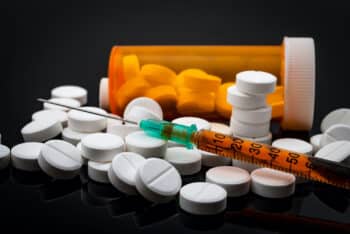Fentanyl Overdose

What Is A Fentanyl Overdose?
Fentanyl is a powerful synthetic Opioid typically prescribed for pain management, especially for individuals experiencing severe pain or for post-surgery care. In recent years, Fentanyl has garnered attention for its illicit use and the potential risk of overdose.
A Fentanyl overdose occurs when an individual ingests an amount of the drug that their body cannot safely process, leading to a series of life-threatening side effects. Fentanyl, due to its significant potency, requires only a minuscule amount to cause an overdose, especially in individuals who are not tolerant to Opioids.
When too much Fentanyl is present in the body, it depresses the central nervous system, particularly affecting respiratory function. The most dangerous consequence of a Fentanyl overdose is slowed or stopped breathing, which can result in decreased oxygen to the brain, leading to hypoxia—a condition that can have immediate and lasting neurological effects, including coma and death.
Signs And Symptoms Of Fentanyl Overdose
The potency of Fentanyl amplifies the urgency of detecting an overdose. A comprehensive understanding of its behavioral, physical, and psychological indicators can equip individuals and their loved ones to respond decisively in such emergencies.
Common signs of a Fentanyl overdose include:
Behavioral Signs
- Confusion or difficulty concentrating.
- Slurred speech or incoherent communication.
Physical Signs
- Shallow or halted breathing.
- Bluish tint to the lips or fingernails.
- Gastrointestinal complications such as vomiting or constipation.
- Decreased heart rate
- Low blood pressure.
- Pinpoint pupils.
Psychological Signs
- Anxiety
- Agitation
- Feeling of impending doom.
- Hallucinations
How To Prevent Fentanyl Overdose
Illicit Fentanyl, often undetectably mixed with other substances or sold as a substitute for them, poses an extraordinary risk due to its extreme potency. Understanding the dangers and being proactive in prevention becomes paramount to avoid the tragic consequences of an overdose. By adhering to certain guidelines and precautions, individuals can significantly reduce the likelihood of Fentanyl-related overdoses.
To prevent a Fentanyl overdose, a person should:
Avoid Mixing Fentanyl With Other Substances
Intentionally combining Fentanyl with alcohol, sedatives, or other drugs can intensify its effects, leading to respiratory depression or other life-threatening situations.
Avoid Street Drugs
Given the increasing prevalence of Fentanyl being mixed with other illicit drugs, even if Fentanyl isn’t the intended purchase, abstaining from street drugs can significantly reduce accidental exposure.
Educate Yourself
Understand Fentanyl’s potency and the dangers of overdose. Being informed helps in making cautious decisions when dealing with the drug.
Adhere To Prescriptions
Only use Fentanyl when prescribed by a certified medical professional. Always follow the dosage and frequency recommendations meticulously.
Utilize Naloxone
Naloxone, commonly known by its brand name Narcan, is a lifesaving medication designed to reverse the effects of an Opioid overdose, including those caused by Fentanyl. Naloxone works by displacing Opioids from their receptors in the brain, thereby restoring normal breathing and consciousness. When administered correctly and in time, it can help prevent death or brain damage.
Naloxone is available for over-the-counter purchase at pharmacies and drug stores nationwide.
It’s important to call emergency services immediately after administering Naloxone as further medical intervention may be required.
Reducing Overdose Risk
The potency of Fentanyl, coupled with its ubiquity in both medical and illicit circles, makes it a particularly dangerous substance if misused.
To reduce the risk of a Fentanyl overdose:
- Know The Signs: Educate yourself and your loved ones about the signs of a Fentanyl overdose. Prompt recognition can mean the difference between life and death.
- Keep Naloxone Accessible: Naloxone can reverse the effects of an Opioid overdose. If you or a loved one is on Fentanyl, having Naloxone on hand and knowing how to use it can save lives.
- Avoid Illicit Drugs: Street drugs are often laced with Fentanyl, making their potency unpredictable. Steering clear of illicit drugs can significantly reduce the risk of accidental Fentanyl overdose.
- Stay Connected: Loneliness and isolation can increase the risk of drug misuse. Regularly checking in on loved ones, joining support groups, or attending community events can provide necessary emotional support.
- Educational Programs: Participate in community-based programs that educate on safe Opioid use and the dangers of Fentanyl. These programs often offer resources and tools to manage and prevent addiction.
- Support Systems: Encourage and foster open discussions about drug use within families, schools, and communities. A strong support system can often prevent misuse and ensure that those struggling get the help they need.
Fentanyl Overdose Deaths In The US
Fentanyl’s infiltration into the illicit drug market has sparked a public health crisis. Whether due to the unintentional consumption of street drugs adulterated with Fentanyl or misuse of its prescribed forms, its rapid onset and profound respiratory depressive effects have made Fentanyl overdoses both frequent and often fatal.
Fentanyl related deaths have witnessed a dramatic surge in the US in recent years. According to the National Institute on Drug Abuse, synthetic Opioids, primarily driven by Fentanyl, were responsible for nearly 73,654 overdose deaths in 2022 alone. The prevalence of these overdoses underscores the need for heightened awareness, preventive measures, and effective intervention strategies in our communities.
Treatment For Fentanyl Addiction
Overcoming Fentanyl addiction is challenging, but with support, recovery is possible. If you or someone you love is grappling with a Fentanyl addiction, contacting a treatment provider to explore your rehab options can be a transformative step towards a brighter future.